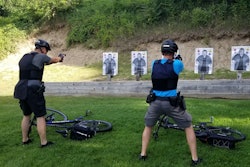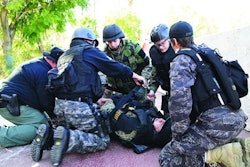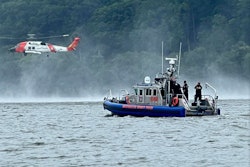On any given shift, any police officer in the United States may come into close contact with any number of tragic and traumatic events. As the saying goes, when the cops show up, somebody—or a lot of somebodys—are having one of the worst days of their lives. Law enforcement officers are continually exposed to victims of heinous and egregious acts of human cruelty from child sex abuse cases to murder and mass murder.
According to the findings published in the Summer 2019 edition of the Journal of the Society for Social Work and Research and the University of Chicago Press Journals, police officers—on average—experience more than three traumatic events every six months in their service. These events include "fatal accidents, murders, suicides, and life-threatening incidents against themselves or others"
Researchers Jordan DeVylder, Monique Lalane, and Lisa Fedina said in that study that "about one third (35%) of police officers who are exposed to traumatic events develop post-traumatic stress, which puts them at greater risk of developing post-traumatic stress disorder."
Treating Officer Trauma
Some agencies have begun to look for training solutions that can help officers deal with trauma. For example, late last month, KMBC-TV reported that the Kansas City (MO) Police Department has launched what its leaders believe to be a "first-of-its-kind" program to help officers deal with the trauma they see and experience every day.
KCPD Sergeant Phil DiMartino told the news station, "We are realizing that the 'suck it up, be tougher' that sort of mentality—it's failing."
DiMartino is helping to lead the charge in a different direction with what he and the agency have dubbed "Tactical Longevity Training."
DiMartino and other agency officials hope the new training will "help prevent burnout and create mentally and emotionally stronger police officers who can then better serve people in high-stress situations."
There are other programs around the country which have similar objectives, and can be deployed at agencies of any size.
For example, the U.S. Department of Health & Human Services—through its Substance Abuse and Mental Health Services Administration—offers something called the Shield of Resilience Training Course, which aims to help officers "learn to recognize signs and symptoms of stress, depression, post-traumatic stress disorder (PTSD), and suicidal thoughts and actions."
There are also myriad private mental health and wellness professionals across the United States to whom agencies may turn for advice and counsel on building an "in-house" wellness program.
Include Essential Elements
Some of the essential elements to any good training course on reaction to traumatic stress, officer resiliency, or "tactical longevity" include (but are in no manner limited to):
- Understanding that post-trauma stress—such as physical and emotional response, and other adverse symptoms—can begin long after a traumatic event is over.
- Recognition of common signs of post-traumatic stress response can include physical things like muscle tremors, headaches, dizziness, weakness, and fatigue.
- Perception that some of the cognitive symptoms of post-traumatic response can include nightmares, irritability, difficulty in problem solving or abstract thinking, and memory loss.
- Awareness that those signs and symptoms of stress reaction to a traumatic event can last for just a few hours or can linger for many days, week, or even months.
- Reinforcement of the message that seeking professional medical assistance for any adverse mental/emotional/psychological effects is not a sign of weakness but of strength.
Not every officer who experiences a traumatic or life-threatening event will develop post-traumatic stress, but every officer who does suffer such an outcome should seek and receive the care necessary to ameliorate the problem. This can range from simply receiving the care of friends and family, seeking solace in a church or support group, taking time away from the job, or getting professional medical care.
It has become abundantly clear that agencies must now become more proactive about providing the tools for officers to recognize, respond to, and recover from the harmful impact of their exposure to traumatic events.
However a program for officer wellness and resiliency is created, it must be created and utilized.
Author's Note: In a terrible twist of fate, on the very same day the news report of the KCPD's efforts made headlines, trauma suddenly struck every officer in the area when Officer Daniel Vasquez of the North Kansas City (MO) Police Department was shot and killed while conducting a traffic stop. This blog is dedicated to the memory of Officer Vasquez, as well as to his family, friends, and fellow officers.
Related Article:
Missouri Agency's "Tactical Longevity Training" Reflects Emphasis on Wellness
















